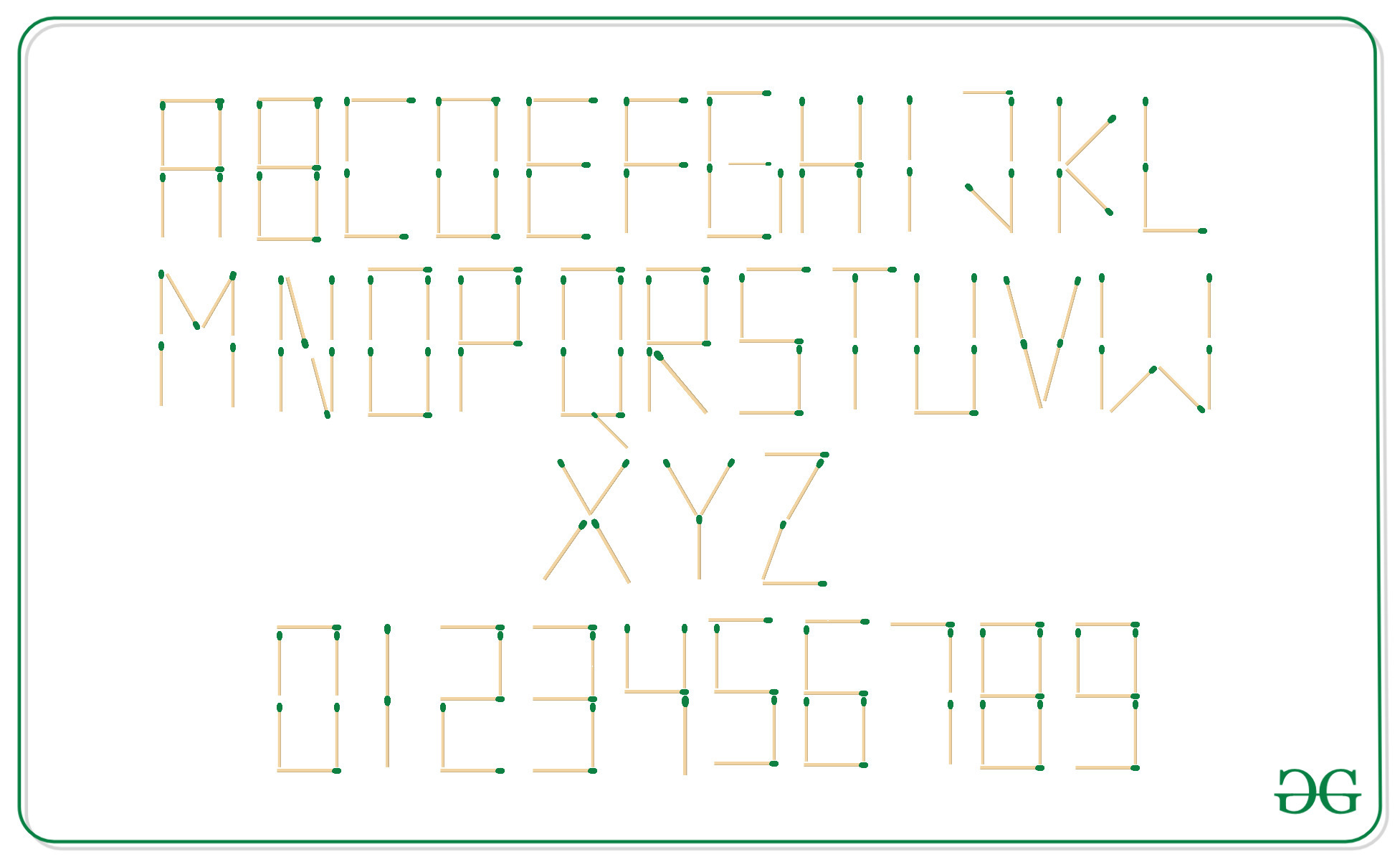给定N个字符串的数组arr [] ,任务是根据表示它们所需的木棍数对这些字符串进行排序。
例子:
Input: arr[] = { “123”, “ABC”, “88” }
Output: 123 88 ABC
Explanation:
Sticks Required by each strings are as follows:
123 -> 12 sticks
88 -> 14 sticks
ABC -> 17 sticks
Input: arr[] = { “GEEKS”, “FOR”, “GEEKSFORGEEKS” }
Output: FOR GEEKS GEEKSFORGEEKS
Explanation:
Sticks required by each strings are as follows:
FOR => 16 sticks
GEEKS => 25 sticks
GEEKSFORGEEKS => 66 sticks
方法:我们的想法是通过计算每个字符串为每个字符所需要的枝数的帮助下所需棒的数量。然后,将木棍和字符串的数量存储在成对的数组中。最后,根据所需的棍棒数量对它们进行分类。
下图显示了代表每个字符所需的摇杆数:

下面是上述方法的实现:
C++
// C++ implementation to sort the
// strings with the number of
// sticks required to represent them
#include
using namespace std;
// Stick[] stores the count
// of sticks required to
// represent the alphabets
int sticks[] = { 6, 7, 4, 6, 5, 4, 6,
5, 2, 4, 4, 3, 6, 6,
6, 5, 7, 6, 5, 3, 5,
4, 6, 4, 3, 4 };
// Number[] stores the count
// of sticks required to
// represent the numerals
int number[] = { 6, 2, 5, 5, 4, 5, 6,
3, 7, 6 };
// Function that return the count of
// sticks required to represent
// the given string str
int countSticks(string str)
{
int cnt = 0;
// Loop to iterate over every
// character of the string
for (int i = 0; str[i]; i++) {
char ch = str[i];
// Add the count of sticks
// required to represent the
// current character
if (ch >= 'A' && ch <= 'Z') {
cnt += sticks[ch - 'A'];
}
else {
cnt += number[ch - '0'];
}
}
return cnt;
}
// Function to sort the array
// according to the number of
// sticks required to represent it
void sortArr(string arr[], int n)
{
// Vector to store the number
// of sticks required with
// respective strings
vector > vp;
// Inserting number of sticks
// with respective strings
for (int i = 0; i < n; i++) {
vp.push_back(
make_pair(countSticks(arr[i]),
arr[i]));
}
// Sort the vector,
sort(vp.begin(), vp.end());
// Print the sorted vector
for (int i = 0; i < vp.size(); i++)
cout << vp[i].second << " ";
}
// Driver Code
int main()
{
string arr[] = { "GEEKS", "FOR",
"GEEKSFORGEEKS" };
int n = sizeof(arr) / sizeof(arr[0]);
sortArr(arr, n);
return 0;
} Java
// Java implementation to sort the
// strings with the number of
// sticks required to represent them
import java.io.*;
import java.util.*;
class GFG{
// Stick[] stores the count
// of sticks required to
// represent the alphabets
static int sticks[] = { 6, 7, 4, 6, 5, 4, 6,
5, 2, 4, 4, 3, 6, 6,
6, 5, 7, 6, 5, 3, 5,
4, 6, 4, 3, 4 };
// Number[] stores the count
// of sticks required to
// represent the numerals
static int number[] = { 6, 2, 5, 5, 4, 5, 6,
3, 7, 6 };
// Function that return the count of
// sticks required to represent
// the given string str
static class Pair implements Comparable{
int num_sticks;
String str;
Pair(int n, String s)
{
num_sticks = n;
str=s;
}
public int compareTo(Pair p)
{
return this.num_sticks-p.num_sticks;
}
}
static int countSticks(String str)
{
int cnt = 0;
int n=str.length();
// Loop to iterate over every
// character of the string
for (int i = 0; i < n; i++) {
char ch = str.charAt(i);
// Add the count of sticks
// required to represent the
// current character
if (ch >= 'A' && ch <= 'Z') {
cnt += sticks[ch - 'A'];
}
else {
cnt += number[ch - '0'];
}
}
return cnt;
}
// Function to sort the array
// according to the number of
// sticks required to represent it
static void sortArr(String arr[], int n)
{
// ArrayList to store the number
// of sticks required with
// respective strings
ArrayList list = new ArrayList<>();
// Inserting number of sticks
// with respective strings
for (int i = 0; i < n; i++) {
list.add(
new Pair(countSticks(arr[i]),
arr[i]));
}
// Sort the list,
Collections.sort(list);
// Print the sorted vector
for (int i = 0; i < list.size(); i++)
System.out.print(list.get(i).str + " ");
}
// Driver Code
public static void main(String []args)
{
String arr[] = { "GEEKS", "FOR",
"GEEKSFORGEEKS" };
int n = arr.length;
sortArr(arr, n);
}
} Python3
# Python3 implementation to sort the
# strings with the number of
# sticks required to represent them
# Stick[] stores the count
# of sticks required to
# represent the alphabets
sticks = [6, 7, 4, 6, 5, 4, 6,
5, 2, 4, 4, 3, 6, 6,
6, 5, 7, 6, 5, 3, 5,
4, 6, 4, 3, 4]
# Number[] stores the count
# of sticks required to
# represent the numerals
number = [6, 2, 5, 5, 4,
5, 6, 3, 7, 6]
# Function that return the count of
# sticks required to represent
# the given string str
def countSticks(st):
cnt = 0
# Loop to iterate over every
# character of the string
for i in range(len(st)):
ch = st[i]
# Add the count of sticks
# required to represent the
# current character
if (ch >= 'A' and ch <= 'Z'):
cnt += sticks[ord(ch) -
ord('A')]
else :
cnt += number[ord(ch ) -
ord('0')]
return cnt
# Function to sort the array
# according to the number of
# sticks required to represent it
def sortArr(arr, n):
# Vector to store the number
# of sticks required with
# respective strings
vp = []
# Inserting number of sticks
# with respective strings
for i in range(n):
vp.append([countSticks(arr[i]),
arr[i]])
# Sort the vector
vp.sort()
# Print the sorted vector
for i in range(len(vp)):
print (vp[i][1], end = " ")
# Driver Code
if __name__ == "__main__":
arr = ["GEEKS", "FOR",
"GEEKSFORGEEKS"]
n = len(arr)
sortArr(arr, n)
# This code is contributed by Chitranayal输出:
FOR GEEKS GEEKSFORGEEKS
时间复杂度: O(N * log N)